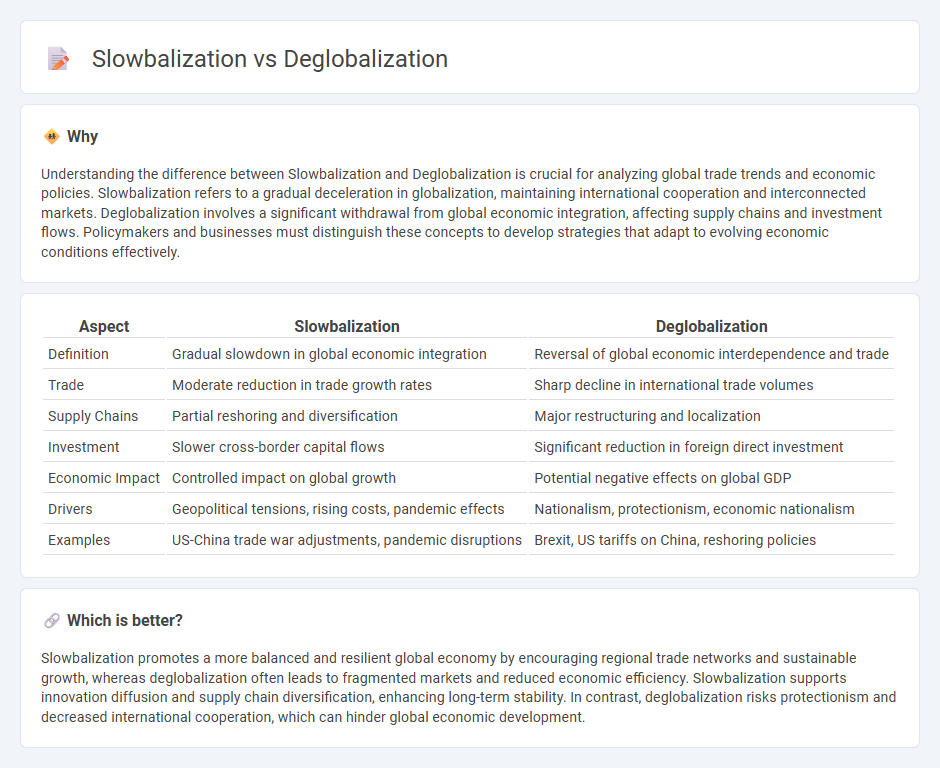
Slowbalization signals a gradual reduction in the pace of global economic integration, driven by shifting trade policies and supply chain adjustments. Deglobalization represents a more pronounced retreat from international trade and investment, often fueled by protectionist measures and geopolitical tensions. Explore these trends to understand their profound impact on global economic dynamics.
Why it is important
Understanding the difference between Slowbalization and Deglobalization is crucial for analyzing global trade trends and economic policies. Slowbalization refers to a gradual deceleration in globalization, maintaining international cooperation and interconnected markets. Deglobalization involves a significant withdrawal from global economic integration, affecting supply chains and investment flows. Policymakers and businesses must distinguish these concepts to develop strategies that adapt to evolving economic conditions effectively.
Comparison Table
| Aspect | Slowbalization | Deglobalization |
|---|---|---|
| Definition | Gradual slowdown in global economic integration | Reversal of global economic interdependence and trade |
| Trade | Moderate reduction in trade growth rates | Sharp decline in international trade volumes |
| Supply Chains | Partial reshoring and diversification | Major restructuring and localization |
| Investment | Slower cross-border capital flows | Significant reduction in foreign direct investment |
| Economic Impact | Controlled impact on global growth | Potential negative effects on global GDP |
| Drivers | Geopolitical tensions, rising costs, pandemic effects | Nationalism, protectionism, economic nationalism |
| Examples | US-China trade war adjustments, pandemic disruptions | Brexit, US tariffs on China, reshoring policies |
Which is better?
Slowbalization promotes a more balanced and resilient global economy by encouraging regional trade networks and sustainable growth, whereas deglobalization often leads to fragmented markets and reduced economic efficiency. Slowbalization supports innovation diffusion and supply chain diversification, enhancing long-term stability. In contrast, deglobalization risks protectionism and decreased international cooperation, which can hinder global economic development.
Connection
Slowbalization and deglobalization both signify a retreat from the rapid pace of economic globalization experienced in the late 20th and early 21st centuries, characterized by reduced cross-border trade growth and investment flows. Slowbalization highlights a deceleration in global economic integration due to factors like rising protectionism, supply chain disruptions, and geopolitical tensions, while deglobalization refers more explicitly to the reversal or shrinking of global interconnectedness. Both phenomena are interconnected as they stem from shared causes such as shifting trade policies and increasing emphasis on domestic economies, impacting global supply chains and international economic cooperation.
Key Terms
Trade Barriers
Trade barriers have risen amid deglobalization trends, with countries imposing tariffs, quotas, and regulatory measures to protect domestic industries and reduce dependency on global supply chains. Slowbalization reflects a more moderate approach, maintaining international trade connections while cautiously managing risks and prioritizing regional partnerships over global integration. Explore the implications of these shifts on global markets and supply chain strategies to understand their long-term economic impact.
Supply Chains
Deglobalization refers to the retrenchment of global supply chains, with companies reshoring manufacturing to reduce dependence on distant markets and mitigate risks from geopolitical tensions and trade disruptions. Slowbalization, by contrast, describes a deceleration in global trade growth, emphasizing regional supply networks that prioritize resilience and sustainability without abandoning international cooperation. Explore deeper insights into how evolving strategies in deglobalization and slowbalization shape the future of global supply chains.
Economic Nationalism
Economic nationalism drives the rise of deglobalization as countries prioritize domestic industries and reduce reliance on international supply chains. Slowbalization reflects a tempered globalization trend characterized by cautious growth and regional partnerships rather than global integration. Explore the distinct impacts of economic nationalism on global trade dynamics and market strategies to better understand this evolving economic landscape.
Source and External Links
Deglobalization - Wikipedia - Deglobalization is the process of decreasing economic interdependence and integration between countries, often marked by declining international trade and investment.
The Specter of Deglobalization | Current History - Deglobalization has intensified since the 2008-9 financial crisis, driven by protectionist policies and global shocks that have led to reduced interaction between national economies and a reversal of some benefits of globalization.
What is deglobalization? | Chatham House - Deglobalization describes a shift toward less global connectivity, marked by stronger nation-states, local solutions, and increased border controls at the expense of international institutions and free movement.
 dowidth.com
dowidth.com